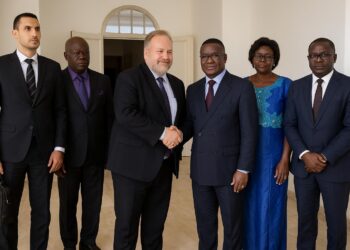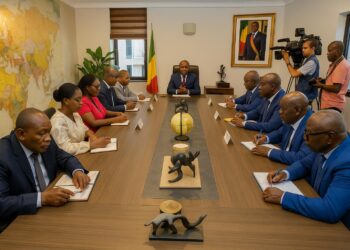French funding boost for Téléma project
Another wave of French concessional funding is heading to Brazzaville as the Téléma social-inclusion project secures almost two billion CFA francs in additional support.
The agreement, initialled on 2 October by Finance Minister Christian Yoka and France’s ambassador Claire Bodonyi, amends the 2019 financing convention that mobilises resources from the Debt-Reduction and Development Contract linking both countries since 2010.
The fresh tranche—1.968 billion CFA francs or roughly USD 3.2 million—will expand Téléma beyond the current urban perimeter into Oyo, Dolisie and Mayéyé, the administrative capitals of Cuvette, Niari and Lékoumou departments respectively.
Works will refurbish each local Circonscription d’Action Sociale, creating reception areas equipped to process social cases digitally and confidentially, a feature officials describe as essential for restoring public trust after the pandemic disrupted many frontline services.
Centrally, the grant finances training and logistical upgrades for the Directorate-General of Social Affairs in Brazzaville, enabling teams to manage an extra 600 vulnerable beneficiaries, half of whom must be young women, in line with Congo’s gender-responsive budgeting commitments.
New pilots for indigenous inclusion
In an innovative twist, Téléma’s addendum dedicates resources to pilot schemes tailored to the socio-economic insertion of indigenous communities, historically under-served in forested regions where formal employment prospects remain scarce.
Consultations with local chiefs and civil-society groups will precede the design of micro-enterprises in non-timber forest products, eco-tourism and community forestry, sectors highlighted in the National Development Plan and the Congo Basin climate partnerships.
Social registry and data backbone
A portion of the envelope funds the rollout of a national social information system that supports a single registry, a long-standing recommendation of the IMF and the World Bank to better target subsidies and avoid overlaps among fragmented welfare programmes.
The ministry expects digital identification to cut onboarding time per beneficiary from three weeks to five days and to provide dashboard-level visibility on cash-transfer utilisation, an improvement that donors say will reassure taxpayers in both Brazzaville and Paris.
Track record of microprojects
Since 2021, nearly one-thousand micro-entrepreneurs have benefitted from Téléma, each receiving on average two million CFA francs to launch ventures ranging from tailoring to fish-drying, according to the project coordination unit.
Site visits to Kinkala, Talangaï and Pointe-Noire show refurbished centres with solar panels, cold-storage rooms and Wi-Fi, investments that municipal officials credit for higher repayment rates on revolving funds.
A former seamstress, Joséphine Malou, now employs four apprentices in Makélékélé. ‘Without the matching grant, my machines would still be in customs,’ she told reporters during the signature ceremony, underlining the project’s potential multiplier effect.
Governance and funding structure
Téléma is financed through the Debt-Reduction and Development Contract, a mechanism that channels French bilateral debt repayments into jointly agreed development projects, thereby limiting fresh borrowing while securing predictable cash flows for social policy.
With the latest addendum, cumulative commitments reach 7.5 billion CFA francs. Disbursement is performance-based: technical milestones unlock tranches, and execution is audited by a steering committee where both governments, the Agence française de développement and civil-society observers hold seats.
Finance Minister Yoka argued that the model ‘aligns perfectly with our fiscal-consolidation path under the IMF programme while protecting the most fragile,’ a statement echoed by Ambassador Bodonyi, who framed the partnership as a tangible dividend of renewed Franco-Congolese ties.
Opportunities for private actors
Although Téléma itself is publicly funded, its ecosystem opens niches for private suppliers of training, digital-ID solutions, micro-insurance and impact evaluation; several Congolese fintech start-ups are already exploring service contracts that could scale sustainably alongside the programme’s geographic extension.
Investors watching social sector procurement note that transparent pipelines and predictable foreign-exchange inflows from France lower execution risk, making Téléma-related tenders a testing ground for blended finance models in Congo’s broader human-capital agenda.
Monitoring impact and ESG relevance
Beyond headcounts, Téléma’s monitoring framework now integrates SDG-aligned indicators such as household income variation, school attendance and carbon footprint of microprojects, an approach consistent with ESG reporting standards sought by global asset managers.
Initial baseline surveys in Brazzaville show average beneficiary income rising 27 percent within eighteen months, while female entrepreneurs report greater access to formal banking, suggesting that the project also serves financial-inclusion objectives pursued by the BEAC.
Carbon experts from the Ministry of Environment estimate that supporting value chains in non-timber forest products avoids roughly 150 tonnes of CO2 annually by discouraging slash-and-burn agriculture, a modest yet symbolically important contribution to Congo’s NDC under the Paris Agreement.
Experts caution, however, that long-term impact hinges on post-grant mentoring and market access; discussions are ongoing with the Chamber of Commerce to create preferential procurement windows for Téléma alumni within public works and agribusiness supply chains.
At the signing, AFD country director Antoine Chevalier hinted that future tranches could leverage the European Union’s Global Gateway facility, potentially doubling the budget and opening the door to co-financing by regional development banks interested in scalable social-protection pilots.











































